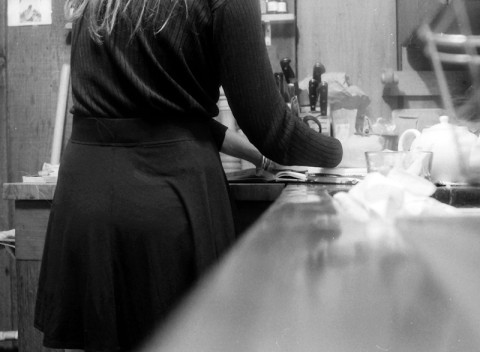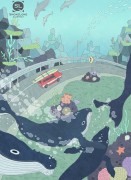“You love me so much you can hardly stand it,” says the mother, who is also a monolith, toppling. Her body is long and broad and her female child has a difficult time looking at it directly. Instead she looks at the microwave, which blinks in a way that seems both friendly and aggressive.
It is ten o’clock in the morning and the child is nine years old.
“If I died you wouldn’t even know what to do with yourself,” the mother says. She pokes her child in the belly and laughs. “You pretend like you don’t like me, but you like me.”
The child betrays herself by smiling. The mother’s body is fragrant. Sweat mats the hair at her temples. She has already been up for hours, working on the house, picking at a long scab on her forearm where a nail scratched her while she was gutting the attic.
There had been many dead squirrels and a jar of green marbles.
“Can I have that?” the child had said.
“You just want everything, don’t you?” said her mother.
This morning the child has just finished her bowl of instant mashed potatoes. An unopened box of trisodium phosphate sits on the floor by her chair, and she places her feet on top of it. The red and yellow packaging looks bright but not cheerful.
“I’d really like it if you could do something besides sit around all day today,” the mother says, rising from the table with the dirty bowl in one hand and a coffee cup in the other. Purpose—of the room, the gutted house, the child—gathers at her shoulders and trails like a cape. “You probably could use some exercise.”
The child thinks of trying a series of different keys in the same lock before finding the right one—the right response—and a tiny pain pierces the back of her head.
“Okay,” the child says.
“Why don’t you ask if there’s anything you can do to help me out today?”
“Is there anything I can do to help out today?”
They march together through their small backyard to stand beside a mound of dirty insulation. The mother tucks the child’s sleeves into a pair of gloves that are too big, does the same with her socks and sweat pants.
Light bounces off dirt and pavement and brick into the child’s face.
The mother points from the pile to the alley and says, “Put that in that.” Beyond the low brick wall there’s the dumpster and a transformer humming above it.
“It’s really hot,” the child says, and her voice fills her with shame.
She is afraid of the alley, like she is afraid of the nicotine stains on the ceiling in her bedroom and the boiler when it clicks on at night.
Sweat drips down her spine and into the split between her cheeks.
“Then you’ll have to chop-chop.”
For a long time after the mother’s car whines out of the driveway and down the street the child cannot move. She stands, smelling her own breath inside the paper mask. Wasps and black flies buzz above the cat shit and rotten fruit hidden in the high grass.
But the mound does disappear, one small handful at a time.
As she works, the child watches from the corner of her eye for approaching cars or strangers, until the phone rings and she goes to answer it.
“I’m calling because I forgot to tell you how much I love you,” the mother says.
The child presses the receiver against her face and moves as close to the window as the cord will allow. Sparkling fibers cover her arms and belly. The little headache comes back, bringing with it another right response, but now the child’s neck and arms and breast buds are itching.
“Don’t you have anything to say?”
The mother’s voice clots with need but the child cannot speak. Itchiness burrows into her skin until she gags. She drops the phone into the sink and fumbles at her pants, the gloves, her socks and underwear. The child is naked in the kitchen, scratching hard enough to hurt, staring out, scratching harder, staring through the window at a little plum tree burdened with fruit.

Notes from Guest Reader Valerie Vogrin
This piece bothered me in the best possible way. Almost every sentence suggests a kind of danger, and I’m left maddeningly undecided about how to feel about the mother-daughter relationship.


 The core workshop of SmokeLong Fitness is all in writing, so you can take part from anywhere at anytime. We are excited about creating a supportive, consistent and structured environment for flash writers to work on their craft in a community. We are thrilled and proud to say that our workshop participants have won, placed, or been listed in every major flash competition. Community works.
The core workshop of SmokeLong Fitness is all in writing, so you can take part from anywhere at anytime. We are excited about creating a supportive, consistent and structured environment for flash writers to work on their craft in a community. We are thrilled and proud to say that our workshop participants have won, placed, or been listed in every major flash competition. Community works.